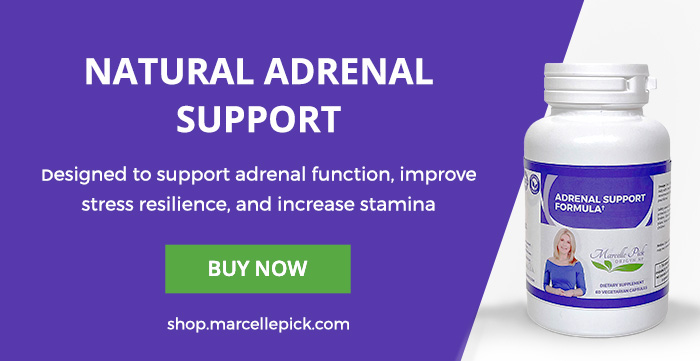Updated 4/03/2022
A few months ago, I was planning to have lunch with my friend Beth. But, as usual, we both had so much on the go that we couldn’t find the time until late in the afternoon. I noticed Beth suppressing a yawn mid-conversation, and asked her how she was doing.
“I’m great,” she said, “but I find that by 3:00 these days I just feel like I need to take a nap.”
This was the first clue: Beth was in the early stages of adrenal fatigue. Now, it’s not that a little bit of tiredness here and there isn’t normal– it is. The key difference with Beth, and with other people who have adrenal fatigue, is that their energy levels follow a distinct pattern.
Typically, this looks like waking up tired, experiencing a small boost of energy mid-morning, and crashing by around 3 PM. Many people also feel wired at night.
A common misconception about adrenal fatigue is that you’re just tired all the time. But, especially in the earlier stages, this may not be the case. Here, I’ll walk you through the most important early signs to watch out for so that you can stop adrenal dysfunction in its tracks.
But first, let’s take a closer look at what adrenal fatigue really is.
What Do Your Adrenal Glands Do?
To really understand why adrenal balance is so important you have to first understand the important function of these small and mighty glands which are located on top of your kidneys. Your adrenal glands produce several hormones – some of which are critical to survival.
The outer layer of the gland, called the adrenal cortex, manufactures hormones you literally can’t live without, including cortisol and aldosterone. Cortisol, which helps you respond to stress and helps regulate metabolism, is the one we focus on most because it’s the one most impacted by chronic stress.
The inner portion of the gland, called the adrenal medulla, also makes hormones. While you don’t have to have these hormones to survive, you certainly don’t feel great when they’re out of balance. One of these, adrenaline, helps you immediately respond to stress, often providing a vital surge of energy when most needed. But because adrenaline also causes a dramatic increase in blood sugar levels, having too much too often can cause a number of other problems.
Proper balance is really the key to avoiding adrenal fatigue. Let’s look at that idea a little more closely, then I will help you recognize early signs of adrenal fatigue and give you some tips to avoid full blown adrenal insufficiency.
Is Adrenal Fatigue Just a Myth?
There’s great debate over the validity of a diagnosis of adrenal fatigue. Conventional medicine hasn’t recognized adrenal fatigue as a valid diagnosis, though it does recognize the more severe issue of adrenal insufficiency. The name itself may be a bit misleading: your adrenals aren’t necessarily experiencing “fatigue” in the way we would tend to think about it.
But even slight imbalances in hormone levels can create health problems – and the hormones produced by the adrenal glands are no exception!
Slight imbalances are a precursor to more serious adrenal problems, like Cushing’s disease and Addison’s disease, the two extreme ends of the spectrum. Adrenal fatigue is a warning, a sign on the highway flashing “Slow Down”. And we have to pay attention to it!
Why are conventional medical practitioners so quick to dismiss adrenal fatigue as a real condition that needs to be addressed? Some say the symptoms are too vague, and could be chalked up to many other conditions. And they’re right — there could be something else going on. My job as a functional medicine practitioner is to listen to my patients and consider every option. I spend far more time talking with my patients than the six minutes many insurance companies allow conventional doctors to spend with their patients. I’m looking for real solutions to underlying problems – not a quick prescription fix.
When I talk about the possibility of adrenal fatigue, I’m also looking at what could be behind the hormonal imbalances; I’m not putting blinders on and looking no further. And the treatments I suggest are natural; lifestyle changes, healthy habits, and some specifically targeted vitamin and mineral support. These changes are unlikely to cause serious side effects — unlike the prescription treatment conventional practitioners are often so quick to suggest.
Where Does Adrenal Fatigue Come From?
There is one single factor that impacts normal adrenal function more than anything else: all that stress I was talking about earlier. When your body is constantly calling for the wrong amount of hormones to be released (whether too much or too little), symptoms occur.
Most people hear the word stress and immediately think of negative events: being attacked by a wild animal (okay, our ancestors had to worry about this one far more often than we do), demands of work and family, grief, or an accident. But even those positive sources of stress – like the roller coaster you just can’t get enough of – kick our stress response into action.
Our bodies have become so acclimated to stress that the reactions are constant – and we don’t even notice them! But our systems are becoming seriously compromised; chronic stress just doesn’t allow those cortisol (and other hormone) levels to regulate. And to make matters worse, your body can hold on to stress for years! The Adverse Childhood Experiences (ACE) Study shows a clear correlation between stress in our early years and negative health outcomes later in life. But that doesn’t mean you can’t change those outcomes! Knowing what you’re dealing with is more than half the battle.
When cortisol levels are too high for too long, your body will slow it’s normal healing and cell regeneration process; interfere with digestion, cognitive function, metabolism, and thyroid function, and weaken your immune system.
When your adrenal glands have to respond to stress continually, it can be a struggle to produce all those key hormones – cortisol, DHEA, and sex hormones. A reduction in any one of these hormones can lead to serious symptoms.
Letting your adrenal health go ignored for too long opens you up to those more severe conditions I talked about earlier. It’s essential to address what’s really going on so we don’t simply give up and turn to pharmaceutical solutions that often just mask the problem, rather than identifying the underlying cause.
The First Sign is Stress
If you’re like most of the women I know, both personally and professionally, stress is no stranger. We are bombarded constantly with demands from all directions. I can certainly relate. Stress is unavoidable, and comes in many forms. Physical pain, career demands, emotional stress from caring for others or experiencing trauma, and so much more. Even the current climate in our country is causing stress for many of the women I see.
The thing is, being constantly bombarded by stressors is what sets adrenal fatigue in motion. And while we can’t stop all that stress from coming at us full force, we can change how we react and respond to it. And that, in turn, can change the physical reactions in our bodies, leaving us with clear signs of adrenal fatigue: exhaustion, depression, muscle weakness and joint pain, mood swings, hair loss, and weight gain. Wouldn’t it be great to avoid all that? The great news is that you can! Let’s talk a little more about adrenal fatigue, and then I’ll give you a few tips to address it – even before it begins!
Early Signs of Adrenal Fatigue
Beyond stress, here are some of the earliest signs that you may be dealing with adrenal fatigue:
- Feeling “tired but wired”. This is a classic sign of adrenal fatigue: you might feel exhausted, but you may also feel like you need to keep going, keep working, or like you can’t sleep or rest
- Feeling anxious. If you’re starting to feel more anxious or “on edge” than you’re used to, or if smaller and smaller things seem to be triggering your anxiety, it could be a sign that your stress hormones are on overdrive.
- Having trouble sleeping. Sleeplessness or insomnia is one of the most common and frustrating early signs of adrenal fatigue. Even women who feel like they can’t keep their eyes open throughout the day often struggle to actually achieve sleep at night. You may also find yourself waking up more frequently throughout the night.
- Craving sugar. Craving sugar or carbs is a classic sign of adrenal fatigue. If you’re finding yourself reaching for sweets to get yourself through the afternoon, it may be a sign that you’re experiencing an early stage of adrenal fatigue.
- Crashing in the afternoon. There’s a reason why the 3:00 slump that my friend Beth described set off alarm bells for me– this is one of the most common symptoms I see in my practice. Disrupted hormone levels associated with adrenal fatigue mean that your body often gets (and loses) energy at all the wrong times.
What Else Should I Be Looking For?
Even before physical symptoms show up, you should be attentive to how you are feeling about your life. If the first thing you think in the morning is “I’m so stressed,” and the last thing you think about at night is a long list of things you still need to do, you’re probably in the danger zone. When you know you are dealing with more than you can handle, it’s time to step back and examine what else might be going on, before you are dealing with a serious crash.
One of the best indicators that your adrenals are suffering is your energy level. If you don’t have any energy without a serious infusion of caffeine, wake up tired even after 7-8 hours of sleep at night, can’t get out of bed easily, or experience a burst of energy late in the evening that makes getting to sleep tough, it’s time to talk to your provider about your adrenal health.
Other symptoms of adrenal fatigue include mood changes, body aches, weight gain, hair loss, low blood pressure, lightheadedness and skin discoloration.
I know that these symptoms can indicate a number of other issues, but if you’re experiencing them, adrenal health deserves a little attention. And there are some simple things you can do to catch the problem early, and avoid complete exhaustion and shut down.
How Can I Avoid Adrenal Fatigue?
If stress is behind adrenal fatigue and imbalance, then reducing stress is clearly the best prevention. You may think it’s impossible – that life is all about stress, and you simply have to push through it and live with the symptoms. But that’s no way to live!
I can help you find strategies for decreasing stress and help you get back to your most vibrant, energetic self! When I see women who are complaining of symptoms I know can be stress related, I recommend a series of tests that evaluate cortisol and DHEA levels. What I’ve seen over the years is remarkable: 75-80 % of these women had some kind of impaired adrenal function. Catching adrenal imbalances when they are mild saves so much pain and suffering, but taking preventative action is even better.
Let’s take a look at some steps that can help stabilize cortisol levels and restore health to even slightly impaired adrenal glands.
Eat Intentionally to Support Adrenal Health
There’s no doubt in my mind that eating well is essential to good health. When it comes to adrenal health, there are foods you should avoid, and foods that can help restore balance.
Essentially, it boils down to eating real food. Whole, unprocessed foods will give you so much more than anything that comes in a box with ingredients you can’t pronounce.
If you suspect an adrenal issue, avoid caffeine (no matter how much you think you need it) to allow for better sleep at night. Sugar, refined carbohydrates, processed foods, and hydrogenated oils are also best avoided.
So what should you eat? Easy to digest foods rich in nutrients, low in sugar, and that contain healthy fat and fiber and protein are the best options for fighting off adrenal fatigue. Some of my favorites are avocado, coconut, olives, fatty fish, cruciferous vegetables, nuts and seeds, and fermented foods for their probiotics.
Get Quality Rest and Sleep
A physical injury may force you to slow down, but we often ignore other forms of stress for far too long. If you are pushing yourself constantly, there’s bound to come a time when you just can’t push any further. Think about the last time you had a full afternoon with nothing on your schedule. Do you remember how great it felt to simply sit and relax?
Giving yourself permission to rest can also help you reflect on what you truly love. Doing things that bring you joy is one of the best stress relievers out there. Sometimes we push ourselves so much that we can’t even remember what those things are!
Quality sleep is also crucial to adrenal health. A couple of easy steps to take is to set a schedule for yourself and stick to it – even on weekends. Find a reasonable bedtime, and set aside at least 8 hours for sleep each night.
Identify and Deal with Stressors
You can’t make appropriate changes to your lifestyle and habits if you don’t know where stress is coming from. Women are so often used to dealing with constant demands that they don’t even consider them stressful until they really sit down and talk about them. Making a list can be a great way to really examine your life and see what’s working – and what’s not!
Emotional stress can’t be ignored either. You might think it’s easier to push away unresolved emotional burdens, but hanging on to these also means hanging on to the stress they create. Facing them directly, through counseling or other techniques, will finally free you from their strain.
Support Your Adrenals Naturally
Natural supplements can be key in preventing or reversing adrenal fatigue. It’s so hard to get all the appropriate nutrients your body needs from food, especially with modern agricultural practices. My adrenal health products have been specifically tailored to address whatever symptoms you are experiencing, whether you find yourself constantly wired, or excruciatingly tired.
In addition to supplements, there are a number of herbs and spices that can help reduce stress and keep your adrenal glands healthy. Adaptogenic herbs like ashwagandha, rhodiola rosea, and holy basil can be added to recipes to help reduce strain on your adrenal glands. Many of which are in my adrenal health products.
Don’t Forget You Need Support
While you can take control of some of your lifestyle choices on your own, if you’re adding supplements you should always talk with a medical professional to be sure there are no potential interactions with other medications or supplements you are taking. If you find yourself exhibiting symptoms that concern you – whether mild or more severe – seek out professional support. I recommend a functional medical practitioner who will take the time to listen to all your concerns, do the appropriate testing, and find the supplements or treatment that is most appropriate for your unique experience.
Address Stress and Avoid Adrenal Fatigue
If you’re already facing uncomfortable symptoms, your adrenal glands might already be compromised. Healing won’t happen overnight, but in most cases I see dramatic improvement within six months.
If you are just starting to notice how stress is impacting your life, you can feel better even faster. Taking charge immediately and controlling your stress levels instead of letting stress control you can help you avoid reaching the breaking point.
Taking steps to alleviate stress, improve your health, and find joy can leave you feeling better than you ever remember! Remember, you only get one life. Shouldn’t you enjoy every minute of it?








